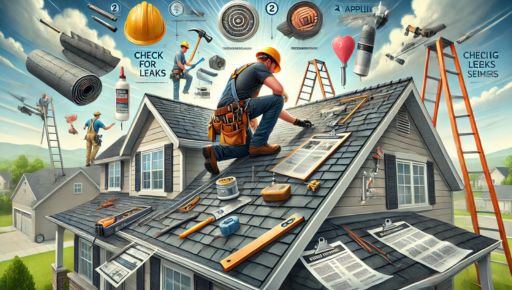Introduction to Roof Repairing
Roof repairing is an essential part of home maintenance that ensures your property remains safe, secure, and protected from the elements. Whether your roof has suffered damage from severe weather or is simply showing signs of wear and tear, timely repairs can prevent further complications and costly replacements. In this guide, we’ll explore the basics of roof repairing, common issues, and tips for successful repairs.
Why Roof Repairing is Important
A well-maintained roof is crucial for the structural integrity of your home. Over time, your roof can experience damage due to factors like heavy storms, aging, or poor installation. Roof repairing is necessary to prevent issues such as leaks, water damage, mold growth, and weakened structural elements. Addressing minor problems early can save you from larger, more expensive repairs down the line.
Common Roof Problems That Require Repairing
Understanding common roof problems can help you identify when roof repairing is needed. Here are some of the most frequent issues homeowners face:
- Leaks and Water Damage: One of the most common roof problems, leaks, can cause water to seep into your home, leading to ceiling stains, mold growth, and damage to insulation.
- Damaged Shingles: Over time, shingles can become cracked, curled, or missing entirely due to weather conditions or normal wear. Replacing damaged shingles is vital to maintaining the roof’s protection.
- Clogged Gutters: Blocked gutters can cause water to back up on the roof, leading to rot and other structural issues. Regular cleaning is important to prevent this.
- Poor Ventilation: Insufficient attic ventilation can cause heat and moisture buildup, which can warp the roofing materials and lead to premature aging.
- Flashing Issues: Flashing around chimneys, vents, and skylights can wear out or become damaged, leading to leaks and water infiltration.
When Should You Call a Professional for Roof Repairing?
While minor roof issues can sometimes be handled by homeowners, it’s important to know when to call in the professionals. If you notice any of the following signs, it’s time to contact a roofing expert:
- Extensive Shingle Damage: If you’re missing more than a few shingles or if they’re cracked or curled, it’s best to call a professional to assess the damage.
- Water Stains Inside: If you notice water stains or spots on your ceiling, it’s an indication of a potential leak that needs immediate attention.
- Sagging Roof: A sagging roof can indicate serious structural issues that require professional repair.
- Damaged Flashing or Seals: Flashing around chimneys, skylights, or vents can wear out over time, causing leaks. A roofer can replace the flashing and prevent further damage.
DIY Roof Repairing: What You Need to Know
For minor issues, some homeowners may attempt roof repairing themselves. However, it’s essential to approach DIY roof repairs with caution. If you have experience and access to the right tools, you may be able to replace a few shingles or clear gutters. Follow these basic steps:
- Inspect the Roof: Safely inspect your roof for visible damage, such as missing shingles or damaged flashing. Look for signs of leaks inside the attic as well.
- Replace Shingles: If you need to replace damaged shingles, ensure you use the same type and style as the existing ones. Properly align them to avoid water penetration.
- Clean Gutters: Clear debris from gutters to ensure proper drainage. This will prevent water buildup and damage to your roof.
- Seal Small Leaks: If you find a small leak, use a waterproof sealant to temporarily patch the area until professional help can arrive.
Hiring a Professional for Roof Repairing: Key Considerations
While DIY repairs are possible for minor issues, hiring a professional roofer is often the best course of action for more serious problems. Here are some key considerations when hiring a roofing contractor:
- Experience: Look for a contractor with extensive experience in roof repairing and a track record of successful projects.
- Insurance and Licensing: Make sure the contractor is licensed and insured to perform roofing work in your area.
- Estimates: Always get multiple estimates to ensure you’re getting a fair price for the repairs.
- Warranty: A reputable roofer should offer a warranty on their work to protect you in case of future issues.
Conclusion: Timely Roof Repairing Saves Money
Regular roof maintenance and timely repairs can extend the lifespan of your roof and prevent costly replacements. By staying vigilant and addressing any signs of damage, you can protect your home and ensure that your roof continues to function effectively. Whether you choose to tackle minor repairs yourself or hire a professional, roof repairing is an investment in the long-term health and safety of your home.



